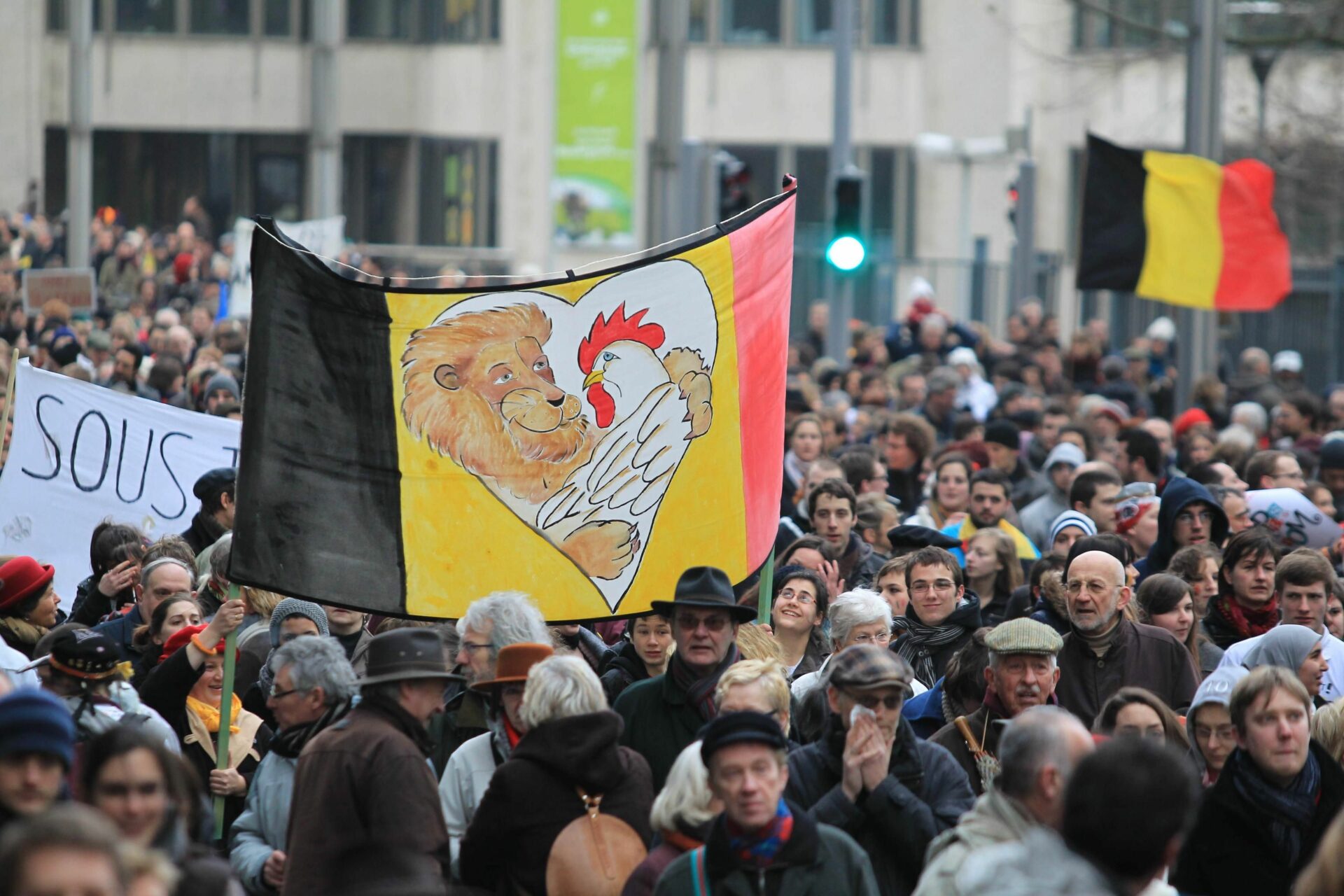On Sunday, nearly 8.5 million Belgians will vote in federal, European and regional elections. The latest polls have given an indication to the possible winners, losers and how the next five years could look like in Belgium.
Commissioned by RTL and conducted by Cluster17, the survey was conducted online from 28 to 31 May 2024 among a sample of 2,641 people (1,000 Walloons, 501 Brussels residents and 1,140 Flemish people) aged 18 and over.
The margin of error is between 1.3% and 3% in Flanders, between 1.4% and 3% in Wallonia and between 1.9% and 4.5% in Brussels.
Brussels
For voting intention in the European elections for Brussels residents, Francophone centre-right liberals MR (22.4%) are just ahead of the radical left PTB (20.2%). Both parties are predicted by pollsters to make significant gains at the expense of the Francophone socialist PS party (15.5%), who have seen their polling lead ebb away in the Belgian capital since 2019.
The declining French-speaking greens, Ecolo (14.5%), are in fourth place, followed by French-speaking centrist parties Les Engagés (7.4%) and DéFi (5.7%). Several parties are around 1-3% on European voting intentions in Brussels, including the two Flemish nationalist parties, N-VA and Vlaams Belang. In Brussels, both French-speaking and Dutch-speaking parties stand, with voters being able to choose their electoral college.
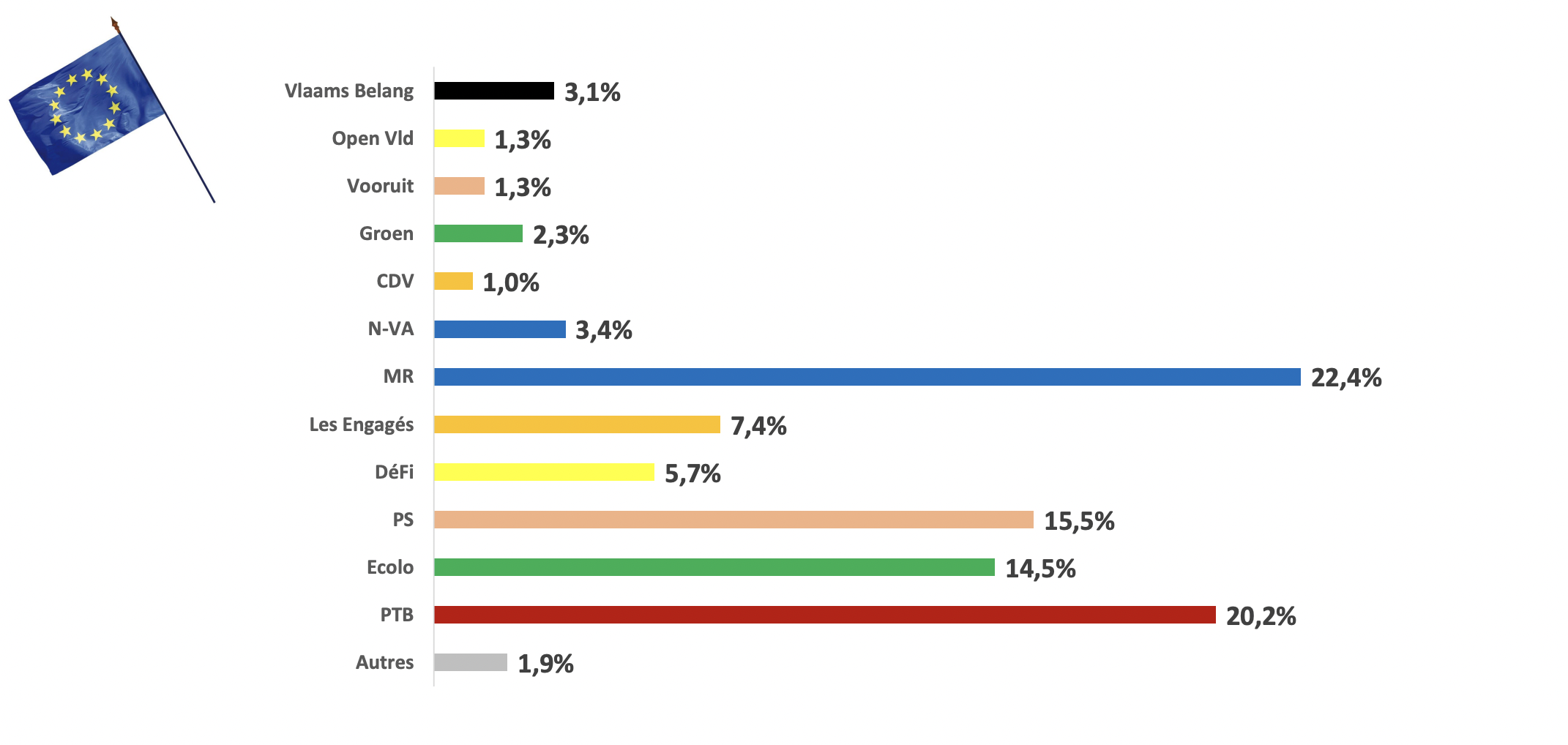
European voting intentions in Brussels, 29-31 May 2024.Question: If the European elections were held next Sunday and the candidates were as follows, who would you be most likely to vote for? Credit: Cluster17 / RTL
In voting intentions among Belgians for the federal elections, the same dynamic plays out. MR's healthy lead (22,9%) has been maintained, tailed again by PTB (19.8%) – who would be up by a staggering 7.5 percentage points in comparison to their 2019 federal election result.
The big winners of 2019 are being punished in the polls: closing off the podium, PS (15%) have made the top three but continue to lose support at the federal level, while Ecolo (11.6%) are also down and in for a tough night in Brussels. The party is down by a sizeable 10 percentage points compared to 2019.
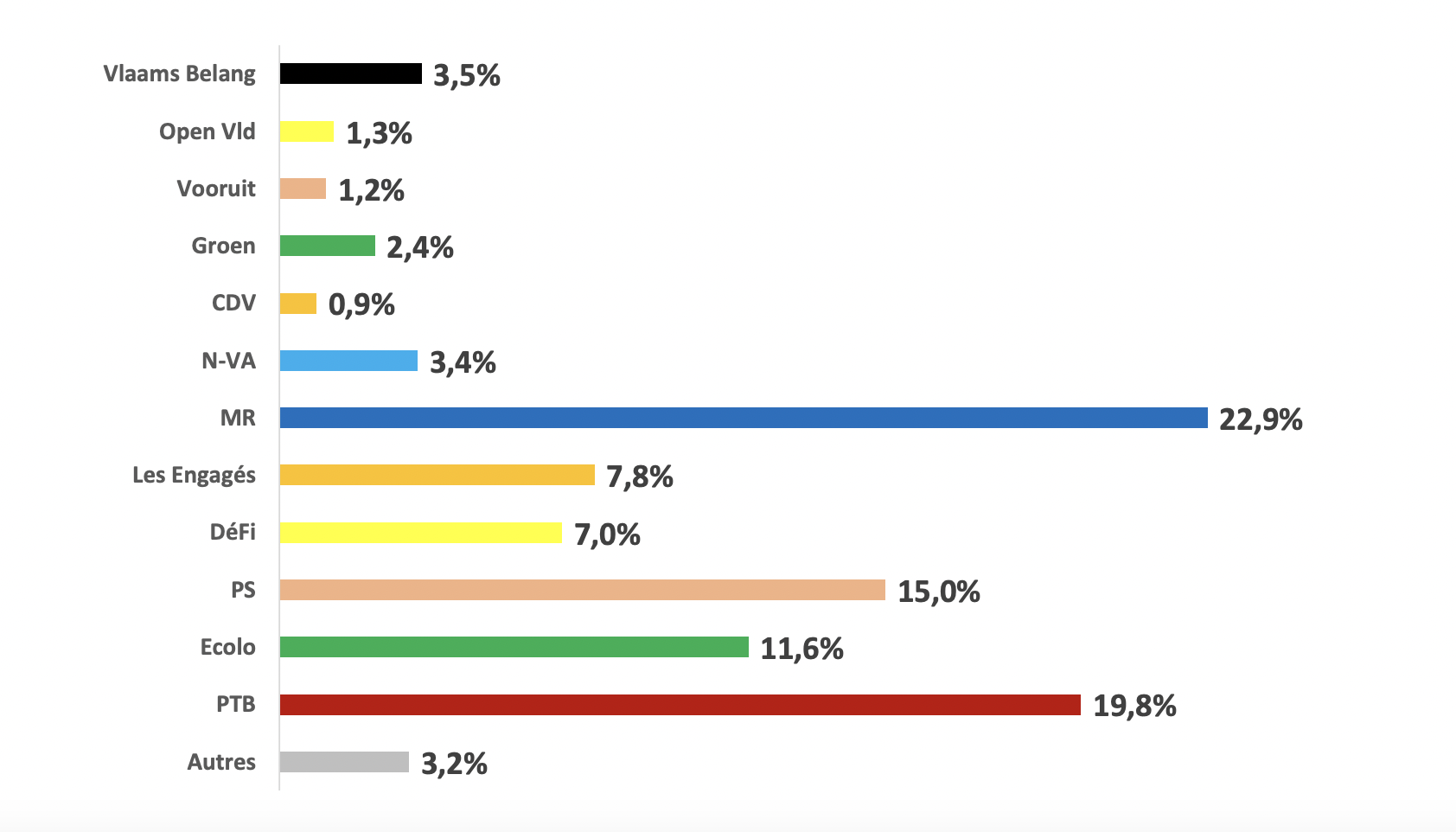
Federal voting intentions in Brussels, 29-31 May 2024. If the federal parliamentary elections were held next Sunday and the candidates were as follows, who would you be most likely to vote for? Credit: Cluster17 / RTL
Behind them, centrist parties Les Engagés (7.8%) and DéFI (7.0%) are neck and neck, with the former enjoying a large resurgence across Francophone Belgium which could see them become key stakeholders in future government formations. It is important to note that the Brussels results have a margin of error up to 4.5%, which means we could be in for some possible surprises on Sunday.
These polls were taken before MR’s racism controversy, where a senior figure told a PTB politician with a mixed background that "he doesn’t need to stay in Belgium" during an election debate. This outburst could affect their result in the Belgian capital. However, MR have been campaigning heavily on security issues in Brussels, with a plan to bring in the army and are not in favour of expanding the police force.
PTB's success has been partially down to being very vocal about the war in Gaza, but also about the "social emergency" in Brussels where mainstream parties have "all failed," as PTB leader in Brussels Françoise de Smet told The Brussels Times back in February. MR was also approached but said they do not comment on polls.
This week, De Smet also said in a TV debate organised by BX1 that PTB is open to "a left-wing coalition in Brussels without MR" – something which was reciprocated by David Leisterh, the MR leader in Brussels: "We will never go with the PTB or Vlaams Belang." DéFi and Les Engagés also said they were "unable" to govern with PTB.
Flanders
In the north of Belgium, the two Flemish nationalist parties still appear to be the only runners in the race. Far-right Vlaams Belang (27.2%) are still nearly ten percentage points ahead of right-wing N-VA (19.6%). N-VA were in recent years the largest Flemish party up until 2019, when they were frog-leaped by Vlaams Belang.
Flemish socialists Vooruit (13%) are enjoying a resurgence and would win bronze, but are still very behind Bart De Wever's N-VA and are hotly pursued by the Flemish Christian Democrats CD&V (12%).
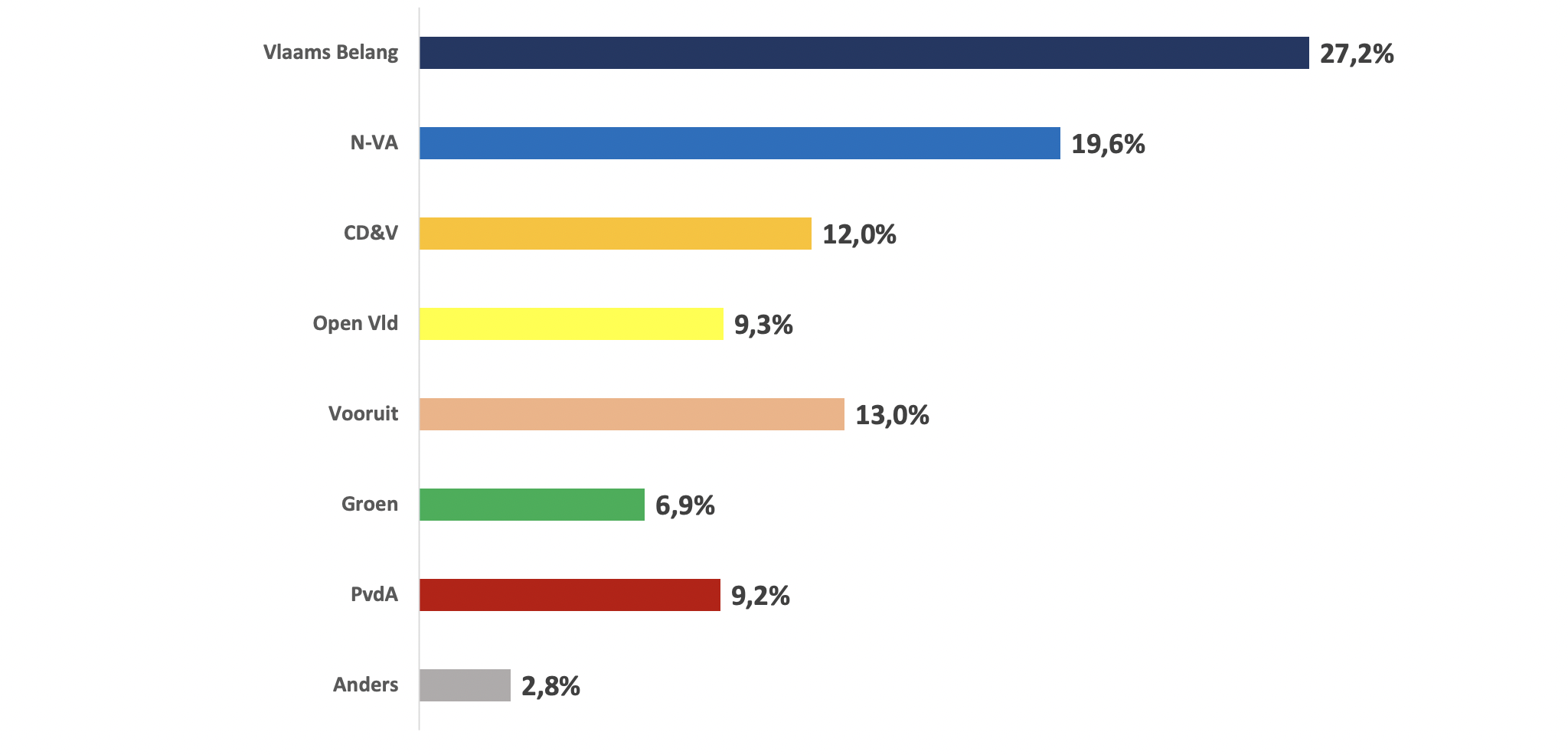
Federal voting intentions Flanders, 29-31 May 2024. If the federal parliamentary elections were held next Sunday and the candidates were as follows, who would you be most likely to vote for? Credit: Cluster17 / RTL
Radical left PVDA (9.3%) are enjoying their rise in popularity in the north, just ahead of Belgian Prime Minister Alexander De Croo's liberal Open VLD, (9.2%) who have been helped by the Prime Minister’s very visible role during the Belgian EU Presidency.
Flemish green party Groen (6.9%) continue to be unable to overcome the damage from the nuclear debate which gripped Flanders, and they have paid a heavy price for it. The margin of error in Flanders is up to 3%.
Importantly, all parties, including N-VA, have ruled out working with Vlaams Belang. This is according to the Belgian political principle of the cordon sanitaire around the far-right, in place since 1989.
Wallonia
Wallonia sees a stand-off between the Socialist Party (24%) and MR (23%). The liberals are eating away at the PS’ lead, and are in with a real chance at becoming the largest party in French-speaking Belgium.
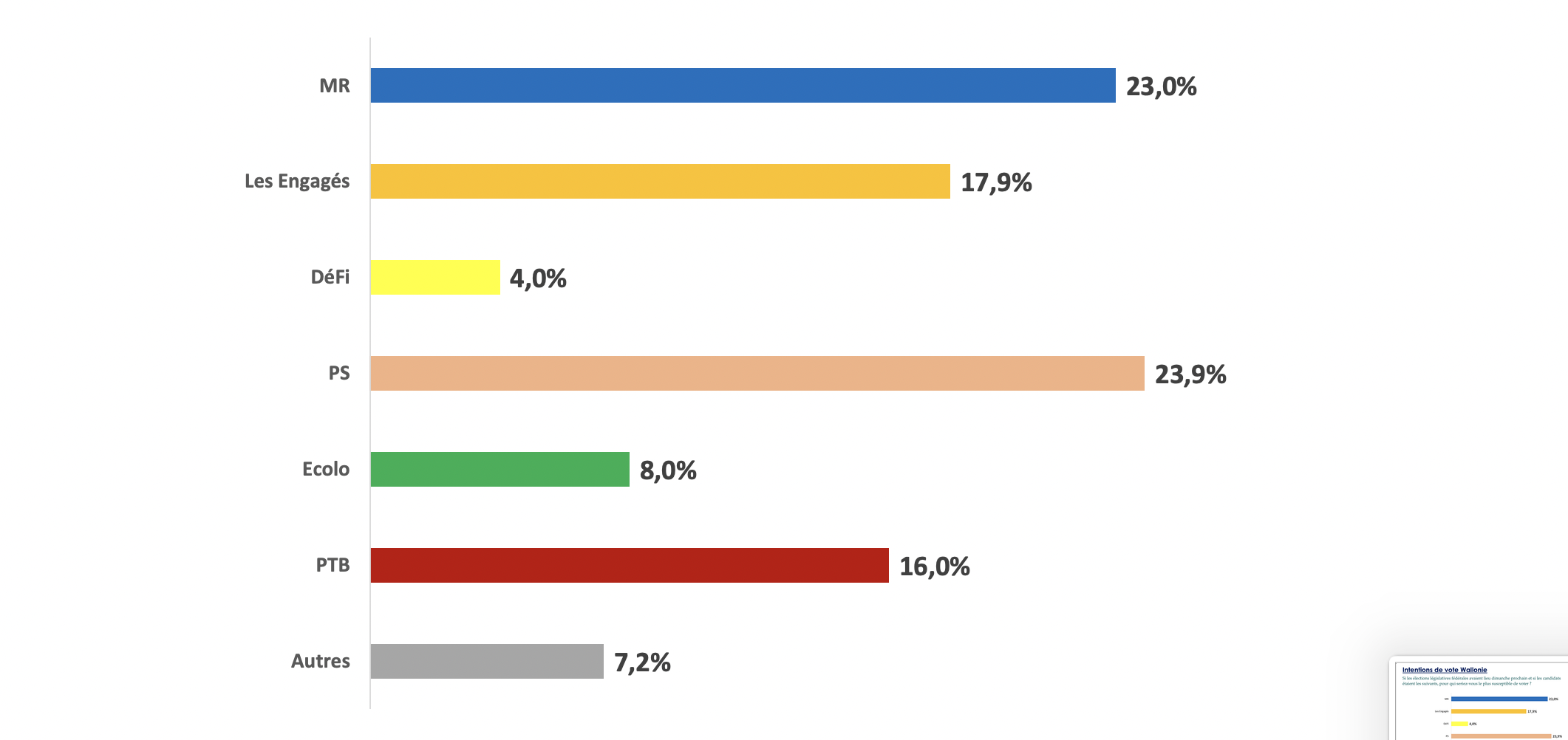
Federal voting intentions Wallonia. If the federal parliamentary elections were held next Sunday and the candidates were as follows, who would you be most likely to vote for? Credit: RTL / Cluster17
However, Wallonia’s big electoral story could be the resurgence of centrist Les Engagés, who are up by 7.2 percentage points from 2019, surging into third place in the south of the country.
Once again, Ecolo (8%) are set to lose the biggest in Wallonia too, down by 6.9 percentage points. DéFi (4%), are up by four but still trail the big parties.
Possible seat formations
According to various analyses, when adding the political families together (socialists, liberals, greens, etc) in a bid to calculate the seat allocation in proportion to the polls, the socialists (PS and Vooruit) come out on top with 29 combined seats – the same as 2019.
Vlaams Belang have 26 seats as a standalone party in Flanders and Brussels (8 more than in 2019). The liberals (MR and Open VLD) have 25 combined seats, followed by a tie between PTB-PVDA, N-VA and the Christian democrat family (CD&V and Les Engagés) – all with 20 seats.
According to these polls, N-VA are losing 5 seats, while PTB-PVDA are gaining 8. The Christian Democrats are up by 3 seats.
DéFi are set to have only one MP (down by 1) – but it is the green political family which is set to lose 12 seats across the country, having a total of only 9. In 2019, they were the fourth biggest family grouping (third if excluding N-VA).

